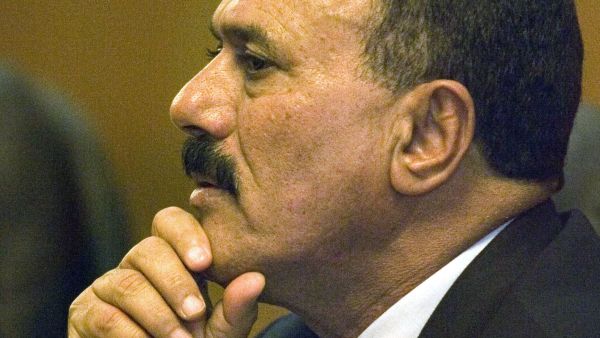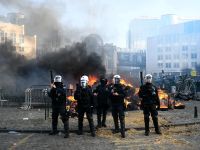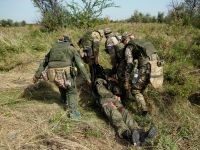President Ali Abdullah Saleh has left Yemen On Sunday to Oman after giving a farewell speech on Yemen TV.
In his speech he also asked his people for forgiveness and announced that he is leaving to seek medical treatment in the USA after being granted immunity from persecution.
“I will travel and return for the next president’s swearing-in ceremony,” said Saleh. Elections are due to be held on February 21, though the parliament has already named Vice President Abd Rabbo Mansour Hadi as the sole candidate.
In the conference aired on Yemen TV, Saleh announced that all his authorities are now delegated to Hadi as well as promoting him to Field Marshal, head of the Yemeni military.
“I promote Hadi to the rank of Field Marshal as a reward for his loyalty,” said Saleh in his farewell speech.
Associated Press reported that Saleh will now head to Oman, en route to the United States for medical treatment. While, the US is not willing to offer him permanent leave to remain, it is reportedly trying to find a country willing to take the ousted president.
On Saturday the Yemeni parliament finally approved Saleh’s controversial immunity law, after it was repeatedly postponed, and finally amended, since December. Prime Minister of the interim government Mohammed Salem Basundwa gave a brief, tearful speech prior to the vote, designed to motivate MPs to vote in favor of immunity for Saleh.
“I know that by asking you to approve this law I will be cursed by some people, and some others will be blessed but as I told you before I am ready to be killed in the street for this country,” said Basundwa.
Following the law’s approval, independent youth marched in Change Square, voicing their rejection of any immunity on Saturday night. A video produced by the SupportYemen campaign, called “take a wake in my shoes”, sought to highlight their demands to the international community, and explain why they cannot accept the immunity law.
However, before being approved, the law was amended to remove the blanket amnesty for Saleh’s aids and regime over the last 33 years. The final version of the law limited the immunity to officials only, and only for “politically motivated” crimes committed while conducting official duties.
UN envoy Jamal Benomar welcomed the law in a press conference on Saturday but made it clear that the immunity does not cover certain crimes.
“The UN cannot condone a broad amnesty that covers UN classified crimes against humanity, genocide, war crimes, gross violations of human rights, and sexual violence," said Benomar.
But according to the law, Saleh’s now enjoys full immunity from prosecution in Yemen. However, the immunity only extends to the date that the law was passed. Even Saleh is accountable for any crimes committed from January 22.
A National Reconciliation and Transitional Justice project will also be set up by the government to offer compensation to victims’ families.
“The immunity includes everything, even Al-Nahden explosions that targeted Saleh, as no blood is more expensive than another,” said MP Ali Abd Rabu Al-Qadhi of the independent bloc. “The National Reconciliation project will consider those who lost relatives or properties.”
On Sunday, the air force protested at Sana’a International Airport, demanding the removal of Saleh’s half-brother, Mohammed Saleh Al-Ahmer, chief of the air force. Many high-ranking officials are also members of Saleh’s family – and campaigners have been calling for their removal as well.
Flights were delayed due to the protests, while arriving flights were diverted to Taiz, Hodeida and Aden, according to Colonel Ahmed Saleh.
“We will never give up our demands, if General Mohammed Saleh Al-Ahmer listened to us and gave us our rights we would have accepted, but now it is too late, we demands his departure above anything,” said the Colonel.
According to Saleh, Al-Ahmer stole billions of rials under the name of air force employees’ bonuses, nutrition packs and weapons. He also deprived them of promotion opportunities for years.
Minister of Defense Mohammed Nasr Ahmed met with Al-Ahmer to solve the situation, while Hadi promised to respond to their demands within two days.
By Shatha Al-Harazi








